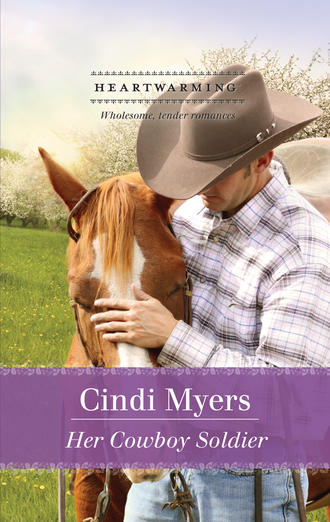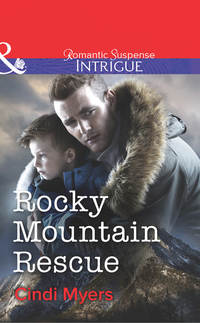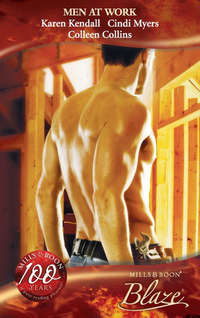
Полная версия
Her Cowboy Soldier
War was a sure cure for wanderlust, he’d decided. If he never left Hartland again, that would be fine with him. For better or worse, he was home now.
* * *
AMY GRIPPED THE steering wheel and tried to get as tight a hold on her emotions. What had just happened? One moment she’d been standing, chatting with Josh as if they were old friends and then wham, she’d been aware of the two of them, alone in the darkness. The moment felt too intimate, as if at any second he might pull her close and kiss her.
She shook her head, banishing the image. Since Brent’s death she hadn’t even thought of kissing anyone. For the past three years she’d paid attention only to what was in front of her, what had to be done—making a living and taking care of her daughter. But lately—since coming to Hartland—she’d begun to notice more...the smell of fresh strawberries from the greenhouse, the feel of a soft breeze on her bare arms, the curve of hard muscle in the forearms of a handsome man. And she’d begun to remember things, such as how good it might feel to have a man’s arms around her.
But why now? And why Josh? Because he reminded her of Brent?
He bore no physical resemblance to Brent; it was probably just the whole military thing—knowing he’d been where her husband had been and done things her husband had done. That he’d been injured and Brent had been injured, but Brent was the one who never came home.
A fresh wave of pain swept over her—would it never go away? Resisting the grief, her mind returned to Josh. He’d been so relaxed and easygoing—so whole, despite his missing hand. Why should he, who didn’t have a wife and a child to come home to, be alive and well when Brent had been taken from her?
She fed this spark of resentment, nurturing it into a tiny flame—anything to avoid dissolving into tears. By the time she pulled up to the town’s only coffee shop, Cookies and Cups, she felt more in control of her shaky emotions.
As she approached the entrance, the door opened and the shop’s owner, Charla Reynolds, dressed in a colorful Mexican skirt and peasant blouse that showed off her ample curves, stepped out onto the front porch. “Amy!” She greeted her friend with a smile and a warm embrace. “I was just about to close up, but I’ve got time for one more cup if you can stay and visit.”
“I hate to keep you, but I could really use it,” Amy said. The two women had met Amy’s second day in town and instantly clicked. Amy’s daily visits to the coffee shop had become long chat sessions in which the friendship had blossomed.
“Thursdays are my late night anyway,” Charla said, as she made her way to the gleaming espresso machine behind the front counter. “I have a novel writers group that meets every Thursday and they always run over. But they’re a great bunch, so I don’t really mind. You should stop by next week, since you like to write and all.”
Amy sat at the table closest to the front counter. “Maybe I’ll do that sometime. But next week is the school board meeting. I have to go for the paper.”
Charla leaned back against the counter and regarded her friend. “All this excitement must be killing you,” she said. “First the town council, then the school board. Do you write obituaries, too?”
“I would if Ed paid me for them.” Ed Burridge, editor, publisher and chief reporter for the Hartland Herald, had hired her to cover school board, town council and county commissioners meetings, as well as write the occasional feature. The pay was pitiful and the hours lousy; Amy loved it. She was being paid to write. It wasn’t Pulitzer-worthy copy, but it was a start.
“What brings you out so late?” Charla asked. “More town politics?”
“Not that. Our sports reporter has mono, so Ed asked me to cover the baseball game.”
“So you got to talk to Smokin’ Scofield?” Charla’s grin was more of a smirk.
Amy laughed. “Please tell me people don’t really call him that.”
“The girls did in high school, or so I’m told. You have to admit, he’s easy on the eye. And single.”
“I don’t care if he’s got three wives, except that would make a good story for the paper.”
“Not even one ex-wife, though considering the dearth of eligible bachelors in this town, he’d have plenty of willing candidates if he showed any interest.”
“And he doesn’t?”
“Are you asking as a reporter, or as a single woman yourself?”
Amy frowned. “I told you, I’m not interested in dating anyone—and especially not a veteran. Every time I look at him, I think of Brent.” She bit her bottom lip, feeling tears threaten once more.
“Sorry.” Charla turned her attention to the espresso machine again, and began making Amy’s favorite mocha latte. She shot a generous dollop of chocolate syrup into a cup with a shot of espresso and added steamed milk. “You’ve never said much about Brent,” she said. “I’m not trying to pry or anything, but if you ever need to talk, you know I’m a good listener.”
Amy let out a ragged breath. “Thanks. It’s not that I blame men like Josh for what happened to Brent—I know he didn’t have anything to do with Brent’s death. But I can’t help resenting the unfairness of it all. War is just so...so random. Why did Brent die when others lived?”
Charla set a full mug in front of Amy and pulled up a chair beside her. “It is unfair,” she said. “You and Chloe sure don’t deserve that kind of pain.”
Amy sipped the mocha, letting the warm sweetness drive away some of the bitterness she still felt over Brent being taken from her. Charla was right—she hadn’t talked much about what had happened. She’d had to be strong for Chloe, and there hadn’t really been anyone to talk to. “When Brent enlisted, I knew there was a chance he could be killed, but I purposely put that out of my mind. It was the only way to survive.”
“You must have been very proud of him.”
How many times had people said this to her? From the soldier who delivered the news of Brent’s death to almost everyone at the funeral, they had all talked about how proud she should be of her soldier husband. “I wasn’t proud,” she said quietly. “I was angry. Furious that he’d decided to leave me and Chloe. I didn’t want him to go and he went anyway.” She squeezed her eyes shut, remembering that last argument, the tears and angry words. They’d tried to patch things up later, long-distance, but he’d died before she’d found it in herself to really forgive him.
She might resent men like Josh who’d come home, but her own guilt kept her grief for her husband alive.
“Of course you were angry,” Charla said. “You wanted him with you and Chloe.”
“He never talked to me about his decision to enlist,” Amy said. “He just did it. He said he wanted to help people—the people in Afghanistan he knew when we were stationed there in the Peace Corps. But all I could think of was that he wanted to be with them more than he wanted to be with me.” She gulped at the mocha, forcing back the tears that threatened, tears of equal parts anger and grief.
“He was a hero and you loved him, but that doesn’t mean he wasn’t wrong,” Charla said.
“I was wrong, too. I shouldn’t have let him leave when we were so angry at each other. I should have kept talking until we settled things between us. But we never got the chance.”
“And you can’t keep beating yourself up over that.” Charla patted her hand. “I know—easy for me to say. I’ve never been married. I don’t even have a steady boyfriend.”
“And why is that?” Amy blotted her eyes with a napkin and seized on the opportunity to shift the conversation to a less-painful topic. “Did you scare off all the men in this town?”
“It’s the curse of living in a town this small—your dating prospects are limited. It’s the one thing I really hate about this place.”
“You could always move to the city. Lots more single men there.”
“Don’t think I haven’t thought about it.” She sipped her coffee. “But I really like it here. And I have the only coffee shop in town, so it’s a sweet setup. I keep hoping Mr. Right will decide Hartland is the perfect place to start a new business or visit on vacation. Or maybe he’s tired of the rat race and wants to settle down in a wonderful little town where not much happens.”
Not much happening had been exactly the quality that had made Amy contemplate staying in Hartland, even after her grandmother didn’t need her help anymore. But she doubted she’d be happy for the long term in such quiet surroundings. She’d spent her whole life having adventures, first with her parents, then with Brent. For their honeymoon they’d gone backpacking in the Himalayas, and after Chloe was born they’d talked about taking her on a tour of Europe, or climbing all fifty-four of Colorado’s peaks over fourteen thousand feet in elevation. They’d toyed with the idea of following in her parents’ footsteps and opening their own adventure tourism company. Or maybe she’d become a travel writer and he’d be her photographer.
After so much adventure, she wasn’t ready to settle down to tame, small-town life. This was only a temporary respite, helping her grandmother and hiding from pain, gathering strength for more adventures to come. Her mother always said if you weren’t challenging yourself, you weren’t living. Life in Hartland didn’t feel very challenging.
“Other than the man situation, I really like it here,” Charla said. “We make our own excitement. Speaking of which, how was the game? Did we win?”
“The Wildcats won. Ed will probably want to put the story on the front page.”
“People think Josh is a miracle worker,” Charla said. “He’s done more for the team in his first year than any of the coaches we’ve had before.”
“He told me he’d never coached before,” Amy said. “I wonder why the district hired him.”
Charla shrugged. “I guess he’s qualified. And he’s a local and a veteran. Plus he was apparently a big baseball jock when he was in high school. Clearly, he knows the game.”
“I wonder who the other candidates for the job were?”
“If you’re that interested, I’m sure they’re listed in the school board minutes somewhere, but what does it matter? Josh is doing a good job.”
“Yeah.” An inexperienced coach with a winning record wasn’t the kind of story that was going to get the attention of a big magazine—the kind where Amy wanted to work after she left Hartland.
“How’s Bobbie?” Charla asked.
“She’s great. She’s going to graduate from the walker to a cane soon.” She wouldn’t need Amy’s help with the orchards much longer.
“The woman is amazing,” Charla said. “I hope I’m like her when I’m her age.”
Amy’s grandmother really was amazing. When Amy was a little girl, she’d believed Bobbie could do anything. She was so strong and capable and independent, the way Amy wanted to be. After Amy’s grandfather died, Bobbie carried on by herself, managing the orchard, taking care of the house and doing everything that had to be done.
Whenever Amy felt overwhelmed by everything she had to do, she thought of Bobbie and felt stronger. She didn’t have to lean on a man. She could take care of herself, and her daughter, without depending on another person. Without risking being hurt again.
CHAPTER TWO
“WHAT DID YOU do to that reporter after the game?” Zach sauntered into Josh’s classroom Tuesday afternoon and tossed a copy of the Hartland Herald on his desk. “Sounds like she’s really got it in for you.”
“Amy Marshall?” While she’d been a little confrontational at first, Josh had thought he and Amy had parted friends. Luck Leads Wildcats To Another Victory proclaimed the headline on the front page. He picked up the paper and scanned the story, anger rising. “‘Coach Scofield noted that this game was meaningless, since the team has already been eliminated from the play-offs,’” he read. “That’s not what I said.”
“Did you get to the part where she points out that you’ve never coached before and much of your initial success has been due to luck?” Zach asked.
“How does she get away with saying something like that?”
“Is she an old girlfriend you dumped or something?” Zach asked.
“No. She just moved to town. Her grandmother is Bobbie Anderson. She has the orchard next to my folks’ place.”
“You obviously didn’t make a very good impression on her. Or maybe she doesn’t like baseball.”
Though Amy had struck Josh as a little reserved, he hadn’t sensed any outright hostility against him. Their conversation in the parking lot after the game had been friendly enough. He’d always thought of himself as a good judge of people, but clearly he’d been all wrong about Amy. “We’ll see about that,” he said.
“What are you going to do?” Zach asked.
“I’m going to talk to her. She owes me an apology.” He tapped the paper. “And a retraction.”
“Careful there,” Josh said. “Make a woman like that mad and no telling what she’ll find to print about you.”
He didn’t care what Amy Marshall had to say about him, as long as it was the truth, not half lies designed to stir up controversy. It was bad enough that Rick Southerland pointed out his shortcomings whenever possible. Knowing someone else—a reporter—agreed with critics like Rick stung. “I can’t let her get away with saying things like that about me,” he said. “I’m the new guy in this job. I constantly have to prove myself.”
“If you say so. But you might be better off just letting this die down on its own.”
Josh wished he could believe the idea that he’d gotten where he was through luck and favoritism would die down, but people like Rick would see that it didn’t. And there was always the chance that more people would join him in siding against Josh in every argument,
As soon as the last bell rang for the day, he drove to the produce stand. If Amy wasn’t there, Bobbie could tell him where to find her. But as he pulled his truck into a space near the front of the stand, he spotted Amy bent over a display of tomatoes. Her long brown hair fell across one cheek and she tucked it behind one ear with slender fingers, revealing a shy smile. The unexpected beauty and innocence of the moment made Josh’s heart thud hard. He took a deep breath, and steeled himself against the rush of emotion. Amy wasn’t his friend. She’d stabbed him in the back and all but ridiculed him in public. He couldn’t let his guard down around her.
She straightened as he approached and regarded him coolly, the smile vanished. “Hello, Josh.”
“We need to talk,” he said.
“I’m busy right now.” She picked up a tomato and weighed it in her hand, her slender fingers curled around the plump red fruit. Was she debating throwing it at him?
He suppressed a smile at the thought and called to Bobbie, who sat at the cash register across the stand. “You can spare Amy for a few minutes, can’t you, Bobbie?”
“Of course. Amy, you can give Josh a few minutes.” She looked over the top of her glasses like a stern schoolmarm.
Amy gave a little shake of her head, but walked out from underneath the canopy that covered the produce stall, to the shade of a gnarled elm. He followed her. Even at this distance the air was redolent with the smell of ripe tomatoes, peppers and onions, the fruits of the Anderson Orchards greenhouses. Josh had worked in similar greenhouses in college, a lifetime ago.
Amy stood with her back to him, arms folded across her chest. He’d come here all fired up to argue with her about the hatchet job she’d done on him in her article, but now she looked, not defenseless exactly, but vulnerable. “I read the article in the paper,” he said. “The one you wrote about the game.”
“Oh.” Her gaze met his, calm and steady. Unreadable.
“Why did you twist my words around?” he asked. “You left out everything I said about the kids and focused on everything negative.”
Color rose in her cheeks. “The story was not negative. I focused on what I saw as the real news angle—how an inexperienced coach managed to turn a losing team around.”
“You misquoted me.”
She unfolded her arms and drew herself up as tall as possible. “I did not.”
“All right, but you left out part of my words. That changed the meaning of what I said.”
“Nothing I wrote in that article is untrue.”
“It’s not exactly true, either.”
She relaxed her shoulders and lowered her voice, visibly pulling herself together. “I have a job to do and I’m trying to do it. That job isn’t to make you look good.”
“I don’t care if you make me look good, but if you’re going to tell a story, tell the whole story, not just the part you think makes good copy.”
She looked as if she really wished she had that tomato back. No projectiles handy, she settled for glaring at him; the fire in her eyes might have moved him if he hadn’t been the one she was searing with the heat. “Look, there’s nothing personal here,” she said. “I’m just trying to do my job.”
“And I’m trying to do mine, without people like you questioning my abilities.”
“The way you’re questioning my abilities?”
Ouch! Okay, so maybe he had that coming. “I already told you I thought you were a good writer. But maybe you should leave the sports stories to the regular sports reporter.”
“Oh, this is so typical!” Her pretense of calm vanished. Face flushed, she clenched her fists at her side. “You think the world revolves around you and what you want.”
“In this case, this is about me. My name is the one you’re smearing in the dirt with your article.” His voice rose, and he struggled to rein in his anger. He didn’t think of himself as an overly emotional guy, but Amy summoned a host of strong feelings, not all of them good, by any means.
“This isn’t about you,” she insisted. “This is about me. I’m the new reporter here in town and I have to prove myself.”
How many times had he said the same thing—that he had to prove that he was capable of teaching and coaching? He wasn’t just the wounded veteran who’d won the job out of pity; he was capable and talented and the best man for the job. Did Amy really think people were judging her the way they judged him?
“You don’t have to prove yourself,” he said. “People already accept you. You’re Bobbie’s granddaughter.”
She shook her head. “That doesn’t matter to an editor in Denver.”
“Why do you care what an editor in Denver thinks?”
“Denver or Dallas, or any city where I try to get a job once I leave here. I need solid clips that show I can write more than fluff about the local 4-H and tedious reports about city council meetings. I need to show I can uncover the real meat of a story.”
“So you decided to go after me to showcase your skills?”
“I didn’t go after you. I went after the story.”
“I don’t get it,” he said. “It’s a baseball game. Why try to stir up controversy?”
“I’m a journalist. I’m trained to look for the story behind the story.”
“This is the Hartland Herald, not the National Enquirer. There is no story behind the story.”
“I don’t agree with you. I think your story is much more interesting than a baseball game.”
“What do you mean by that?”
“You came home from the war and slipped right into a good job and a good life, no problems at all. Do you know how lucky that is? How unusual, even?”
“How do you know I don’t have problems? You don’t even know me.”
“I know the school board went out of its way to make a place for you, and chose you over other candidates who may have been more qualified.”
“So you don’t think I deserve my job?” Saying the words hurt. He hated that she saw him as a charity case.
“Not if every veteran doesn’t get those breaks.”
Every veteran—or the one who could never enjoy the “breaks” he had, because he’d never made it home from the war? Until that moment, he’d forgotten Amy was a war widow. “I’m sorry about your husband,” he said. “But that’s not my fault.”
“This has nothing to do with Brent.”
“Doesn’t it?”
She looked away, but not before he recognized the hurt in her eyes. He felt like a heel for reminding her of that pain. So what if he’d lost a hand? Her husband—and by extension, she and her daughter—had made the ultimate sacrifice. He really was lucky by comparison.
“Never mind,” he said, and turned away.
“Never mind what?”
“Write whatever you want about me. It’s up to me to prove myself despite the naysayers.”
He turned and strode back to his truck, aware of her gaze boring into him. He’d been struggling to prove himself to someone most of his life—his coaches, his father, his superior officers. But most of all, he constantly battled to live up to his own high expectations. One woman’s story in the local paper wasn’t going to change that.
* * *
AMY DIDN’T KNOW who she was more furious with—Josh for questioning the truthfulness of her article, or herself for letting him get to her. So what if she had presented the facts in a particular way to shape her story? That was part of her job, wasn’t it? And maybe the real reason he was upset was because she’d hit too close to the truth. She shouldn’t feel guilty about that, should she?
“What was all that about?” Bobbie didn’t even feign disinterest when Amy returned to the produce stall.
“He was upset about the story I wrote for the paper.” She began picking through a bin of tomatoes, setting aside those with soft spots.
“That story didn’t exactly paint him in the most flattering light.”
“It’s not my job to make him look good.” Amy tossed the tomatoes into a barrel where they saved spoiling vegetables and fruit for a local farmer who fed the produce to his pigs.
“Hartland isn’t Denver,” Bobbie said. “News doesn’t have to be bad to be news.”
“Why are you taking his side?” She tried and failed to hide her hurt.
“I’m not trying to take sides, but if I did, I’d be on your side. If you want to fit in here, you shouldn’t go alienating people right off the bat.”
“Who said I want to fit in?” At Bobbie’s hurt look, Amy wished she could take the words back. “I’m sorry, Grandma. Of course I want to fit in while I’m here.”
Bobbie turned to wait on a young woman who was buying tomatoes, onions and green beans. When they were alone again, she addressed Amy. “I was hoping you’d come to see this place as your home, someplace you’d want to settle down and raise Chloe.”
“I’m not sure I’m the settling down type.” Did she even know what a real home felt like? “But don’t worry. I’ll stay here as long as you need me. When do you see the doctor again?”
Bobbie shifted on her stool, the lines around her face deeper. Was her hip bothering her? Amy knew if she asked, her grandmother would tell her not to fuss. Bobbie hated to be fussed over. “Neal’s taking me tomorrow for a progress report.”
“That’s good.” Not for the first time, Amy wondered what the real relationship was between Bobbie and her neighbor Neal Kuchek. Boyfriend didn’t seem an appropriate term for a man who was in his seventies, but he and Grandma were certainly close. Nice to think that romance could be a part of life even at their age.
“I’ve been thinking,” Bobbie said. “You need to do something besides work here and at the paper. You need to get involved in the town.”
“Involved?”
“A community like this runs on volunteers. You can’t get a feel for what living here is really like unless you throw your lot in with the rest of us and get your hands dirty.”
Amy didn’t want to get her hands dirty. What was the point, since she didn’t intend to stay in town any longer than necessary? “Grandma, I—”
“Humor an old woman. Or think of it as something else you can write about. I want you to find one volunteer project you can get involved in. It’ll be a good way for you to get to know people, to know more what life is like here. Maybe then you’ll understand that giving Josh that coaching job wasn’t an act of charity, but the right way to look after one of our own.”
So that’s what this was all about—another way to defend Josh. “I don’t have anything against Josh,” she protested.
“That’s good to know.” Bobbie’s smile had more steel that sweetness behind it. “Then you won’t mind looking for something good to write about him. As a favor to me.”








